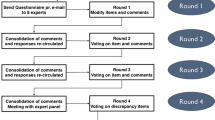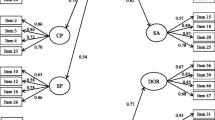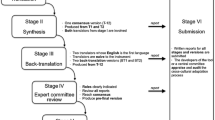Abstract
Purpose
To assess the procedures of translation, cross-cultural adaptation, and measurement properties of breast cancer-specific quality-of-life questionnaires.
Methods
Searches were conducted in the databases MEDLINE, EMBASE, CINAHL, and SciELO using the keywords: “Questionnaires,” “Quality of life,” and “Breast cancer.” The studies were analyzed in terms of methodological quality according to the guidelines for the procedure of cross-cultural adaptation and the quality criteria for measurement properties of questionnaires.
Results
We found 24 eligible studies. Most of the articles assessed the translation and measurement properties of the instrument EORTC QLQ-BR23. Description about translation and cross-cultural adaptation was incomplete in 11 studies. Translation and back translation were the most tested phases, and synthesis of the translation was the most omitted phase in the articles. Information on assessing measurement properties was provided incompletely in 23 articles. Internal consistency was the most tested property in all of the eligible articles, but none of them provided information on agreement. Construct validity was adequately tested in only three studies that used the FACT-B and QLQ-BR23. Eight articles provided information on reliability; however, only four found positive classification. Responsiveness was tested in four articles, and ceiling and floor effects were tested in only three articles. None of the instruments showed fully adequate quality.
Conclusion
There is limited evidence on cross-cultural adaptations and measurement properties; therefore, it is recommended that caution be exercised when using breast cancer-specific quality-of-life questionnaires that have been translated, adapted, and tested.

Similar content being viewed by others
References
Ministério da Saúde. Instituto Nacional do Câncer. (2011). Estimativas/2012 incidência de câncer no Brasil. Retrieved February 01, 2013, from http://www.inca.gov.br/estimativa/2012/estimativa20122111.pdf.
Forouzanfar, M. H., Foreman, K. J., Delossantos, A. M., Lozano, R., Lopez, A. D., Murray, C. J. L., et al. (2011). Breast and cervical cancer in 187 countries between 1980 and 2010: A systematic analysis. The Lancet, 378(9801), 1461–1484.
Hwang, J. H., Chang, H. J., Shim, Y. H., Park, W. H., Park, H., Huh, S. J., et al. (2008). Effects of supervised exercise therapy in patients receiving radiotherapy for breast cancer. Yonsei Medical Journal, 49(3), 443–450.
Springer, B. A., Levy, E., McGarvey, C., Pfalzer, L. A., Stout, N. L., Gerber, L. H., et al. (2010). Pre-operative assessment enables early diagnosis and recovery of shoulder function in patients with breast cancer. Breast Cancer Research and Treatment, 120(1), 135–147.
Petito, E. L., & Gutiérrez, M. G. R. (2008). Elaboração e validação de um programa de exercício para mulheres submetidas a cirurgia oncológica de mama. Revista Brasileira de Cancerologia, 54(3), 275–287.
Lotti, R. C. B., Barra, A. A., Dias, R. C., & Maklufz, A. S. D. (2008). Impacto do Tratamento de Câncer de Mama na Qualidade de Vida. Revista Brasileira de Cancerologia, 54(4), 337–367.
Sandgren, A. K., Mullens, A. B., Erickson, S. C., Romanek, K. M., & McCaul, K. D. (2004). Confidant and breast cancer patient reports of quality of life. Quality of Life Research, 13(1), 155–160.
Pais-Ribeiro, J., Pinto, C., & Santos, C. (2008). Validation study of the portuguese version of the QLC-C30-V.3. Psicologia, Saúde & Doenças, 9(1), 89–102.
Brady, M. J., Cella, D. F., Mo, F., Bonomi, A. E., Tulsky, D. S., Lloyd, S. R., et al. (1997). Reliability and validity of the Functional Assessment of Cancer Therapy-Breast quality-of-life instrument. Journal of Clinical Oncology, 15(3), 974–986.
Terwee, C. B., D.V.H., Bouter, L. M., Stratford, P. W., Patrick, D. L., Alonso, J., et al. (2014). Consensus-based standards for the selection of health measurement instruments—COSMIN 2013. Retrieved June 01, 2014, from http://www.cosmin.nl/.
Koller, M., Aaronson, N. K., Blazeby, J., Bottomley, A., Dewolf, L., Fayers, P., et al. (2007). Translation procedures for standardised quality of life questionnaires: The European Organisation for Research and Treatment of Cancer (EORTC) approach. European Journal of Cancer, 43(12), 1810–1820.
Beaton, D. E., Bombardier, C., Guillemin, F., & Ferraz, M. B. (2000). Guidelines for the process of cross-cultural adaptation of self-report measures. Spine (Phila Pa 1976), 25(24), 3186–3191.
Bullinger, M., Alonso, J., Apolone, G., Leplege, A., Sullivan, M., Wood-Dauphinee, S., et al. (1998). Translating health status questionnaires and evaluating their quality: The IQOLA Project approach. International Quality of Life Assessment. Journal of Clinical Epidemiology, 51(11), 913–923.
Terwee, C. B., Bot, S. D., de Boer, M. R., van der Windt, D. A. W. M., Knola, D. L., Dekkera, J., et al. (2007). Quality criteria were proposed for measurement properties of health status questionnaires. Journal of Clinical Epidemiology, 60(1), 34–42.
De Vet, H. C., Terwee, C. B., Mokkink, L. B., & Knol, D. L. (2011). Measurement in medicine: A practical guide. New York: Cambrigde University Press.
Streiner, D. L., & Norman, G. R. (2008). Health measurement scales: A practical guide to their development and use. Oxford: Oxford University Press.
da Menezes Costa, L. C., Maher, C. G., McAuley, J. H., & Costa, L. O. (2009). Systematic review of cross-cultural adaptations of McGill Pain Questionnaire reveals a paucity of clinimetric testing. Journal of Clinical Epidemiology, 62(9), 934–943.
Puga, V. O. O., Lopes, A. D., & Costa, L. O. P. (2012). Assessment of cross-cultural adaptations and measurement properties of self-report outcome measures relevant to shoulder disability in Portuguese: A systematic review. Revista Brasileira de Fisioterapia, 16(2), 85–93.
Yang, Z., Tang, X. L., Wan, C. H., Zou, T. N., Chen, D. D., Zhang, D. M., et al. (2007). Development of the system of quality of life instruments for patients with breast cancer (QLICP-BR). Ai Zheng, 26(10), 1122–1126.
Condón Huerta, M. J., González Viejo, M. A., Tamayo Izquierdo, R., & Martínez Zubiri, A. (2000). Calidad de vida en pacientes con y sin linfedema despúes del tratamiento del cáncer de mama: Implicaciones en la rehabilitación. Rehabilitación, 34(3), 248–253.
Mihailova, Z., Antonov, R., Toporov, N., & Popova, V. (2001). Evaluation of the Bulgarian version of the European Organization for the Research and Treatment of Cancer Quality-of-Life Questionnaire C30 (version 2) and breast cancer module (BR23) on the psychometric properties of breast cancer patients under adjuvant chemotherapy. Prognostic value of estrogen and progesterone receptors to quality of life. Journal of the Balkan Union of Oncology, 6(4), 415–424.
Yang, P., & Lu, Q. (2009). Investigation on quality of life status of breast cancer patients after operation in follow-up period. Chinese Nursing Research, 23(5A), 1150–1153. (Chinese).
Cerezo, O., Onate-Ocana, L. F., Arrieta-Joffe, P., Gonzalez-Lara, F., Garcia-Pasquel, M. J., Bargallo-Rocha, E., et al. (2012). Validation of the Mexican-Spanish version of the EORTC QLQ-C30 and BR23 questionnaires to assess health-related quality of life in Mexican women with breast cancer. European Journal of Cancer Care (Engl), 21(5), 684–691.
Hahn, E. A., Holzner, B., Kemmler, G., Sperner-Unterweger, B., Hudgens, S. A., & Cella, D. (2005). Cross-cultural evaluation of health status using item response theory: FACT-B comparisons between Austrian and U.S. patients with breast cancer. Evaluations & The Health Professions, 28(2), 233–259.
Heil, J., Holl, S., Golatta, M., Rauch, G., Rom, J., Marme, F., et al. (2010). Aesthetic and functional results after breast conserving surgery as correlates of quality of life measured by a German version of the Breast Cancer Treatment Outcome Scale (BCTOS). Breast, 19(6), 470–474.
Jayasekara, H., Rajapaksa, L. C., & Brandberg, Y. (2008). Measuring breast cancer-specific health-related quality of life in South Asia: Psychometric properties of the Sinhala version of the EORTC QLQ-BR23. Quality of Life Research, 17(6), 927–932.
Montazeri, A., Harirchi, I., Vahdani, M., Khaleghi, F., Jarvandi, S., Ebrahimi, M., et al. (2000). The EORTC breast cancer-specific quality of life questionnaire (EORTC QLQ-BR23): Translation and validation study of the Iranian version. Quality of Life Research, 9(2), 177–184.
Pandey, M., Thomas, B. C., Ramdas, K., Eremenco, S., & Nair, M. K. (2002). Quality of life in breast cancer patients: Validation of a FACT-B Malayalam version. Quality of Life Research, 11(2), 87–90.
Parmar, V., Badwe, R. A., Hawaldar, R., Rayabhattanavar, S., Varghese, A., Sharma, R., et al. (2005). Validation of EORTC quality-of-life questionnaire in Indian women with operable breast cancer. National Medical Journal of India, 18(4), 172–177.
Sprangers, M. A., Groenvold, M., Arraras, J. I., Franklin, J., te Velde, A., Muller, M., et al. (1996). The European Organization for Research and Treatment of Cancer breast cancer-specific quality-of-life questionnaire module: First results from a three-country field study. Journal of Clinical Oncology, 14(10), 2756–2768.
Yoo, H. J., Ahn, S. H., Eremenco, S., Kim, H., Kim, W. K., Kim, S. B., et al. (2005). Korean translation and validation of the functional assessment of cancer therapy-breast (FACT-B) scale version 4. Quality of Life Research, 14(6), 1627–1632.
Yun, Y. H., Bae, S. H., Kang, I. O., Shin, K. H., Lee, R., Kwon, S. I., et al. (2004). Cross-cultural application of the Korean version of the European Organization for Research and Treatment of Cancer (EORTC) Breast-Cancer-Specific Quality of Life Questionnaire (EORTC QLQ-BR23). Supportive Care in Cancer, 12(6), 441–445.
Alawadhi, S. A., & Ohaeri, J. U. (2010). Validity and reliability of the European Organization for Research and Treatment in Cancer Quality of Life Questionnaire (EORTC QLQ): Experience from Kuwait using a sample of women with breast cancer. Annals of Saudi Medicine, 30(5), 390–396.
Awad, M. A., Denic, S., & El Taji, H. (2008). Validation of the European Organization for Research and Treatment of Cancer quality of life questionnaires for Arabic-speaking populations. Annals of the New York Academy of Sciences, 1138, 146–154.
Belmonte Martinez, R., Garin Boronat, O., Segura Badia, M., Sanz Latiesas, J., Marco Navarro, E., & Ferrer Fores, M. (2011). Functional Assessment of Cancer Therapy Questionnaire for Breast Cancer (FACT-B+4). Spanish version validation. Medicina Clínica (Barc), 137(15), 685–688.
Bernhard, J., Sullivan, M., Hurny, C., Coates, A. S., & Rudenstam, C. M. (2001). Clinical relevance of single item quality of life indicators in cancer clinical trials. British Journal of Cancer, 84(9), 1156–1165.
Carlsson, M., Hamrin, E., & Lindqvist, R. (1999). Psychometric assessment of the Life Satisfaction Questionnaire (LSQ) and a comparison of a randomised sample of Swedish women and those suffering from breast cancer. Quality of Life Research, 8(3), 245–253.
Chie, W. C., Chang, K. J., Huang, C. S., & Kuo, W. H. (2003). Quality of life of breast cancer patients in Taiwan: Validation of the Taiwan Chinese version of the EORTC QLQ-C30 and EORTC QLQ-BR23. Psycho-Oncology, 12(7), 729–735.
Coster, S., Poole, K., & Fallowfield, L. J. (2001). The validation of a quality of life scale to assess the impact of arm morbidity in breast cancer patients post-operatively. Breast Cancer Research and Treatment, 68(3), 273–282.
Fernández-Suárez, H. G., Blum-Grynberg, B., Aguilar-Villalobos, E. J., & Bautista-Rodríguez, H. (2010). Validación de un instrumento para medir calidad de vida en pacientes con cáncer de mama. Revista Médica del Instituto Mexicano del Seguro Social, 48(2), 133–138.
Kontodimopoulos, N., Ntinoulis, K., & Niakas, D. (2011). Validity of the Greek EORTC QLQ-C30 and QLQ-BR23 for measuring health-related quality of life in breast cancer patients. European Journal of Cancer Care (England), 20(3), 354–361.
Ng, R., Lee, C. F., Wong, N. S., Luo, N., Yap, Y. S., Lo, S. K., et al. (2012). Measurement properties of the English and Chinese versions of the Functional Assessment of Cancer Therapy-Breast (FACT-B) in Asian breast cancer patients. Breast Cancer Research and Treatment, 131(2), 619–625.
Wan, C., Tang, X., Tu, X. M., Feng, C., Messing, S., Meng, Q., et al. (2007). Psychometric properties of the simplified Chinese version of the EORTC QLQ-BR53 for measuring quality of life for breast cancer patients. Breast Cancer Research and Treatment, 105(2), 187–193.
Wan, C., Yang, Z., Tang, X., Zou, T., Chen, D., Zhang, D., et al. (2009). Development and validation of the system of quality of life instruments for cancer patients: breast cancer (QLICP-BR). Supportive Care in Cancer, 17(4), 359–366.
Wan, C., Zhang, D., Yang, Z., Tu, X., Tang, W., Feng, C., et al. (2007). Validation of the simplified Chinese version of the FACT-B for measuring quality of life for patients with breast cancer. Breast Cancer Research and Treatment, 106(3), 413–418.
Zawisza, K., Tobiasz-Adamczyk, B., Nowak, W., Kulig, J., & Jedrys, J. (2010). Validity and reliability of the quality of life questionnaire (EORTC QLQ C30) and its breast cancer module (EORTC QLQ BR23). Ginekologia Polska, 81(4), 262–267.
Bullinger, M., Power, M. J., Aaronson, N. K., Cella, D. F., & Anderson, R. T. (1996). Creating and evaluating cross-cultural instruments. In B. Spilker (Ed.), Quality of life and pharmacoeconomics in clinical trials (pp. 659–668). Philadelphia: Lippincott-Raven Publishers.
Hui, C., & Triandis, H. C. (1985). Measurement in cross-cultural psychology: A review and comparison of strategies. Cross Cultural Psycology, 16, 131–152.
Costa, L. O., Maher, C. G., & Latimer, J. (2007). Self-report outcome measures for low back pain: Searching for international cross-cultural adaptations. Spine (Phila Pa 1976), 32(9), 1028–1037.
Chopra, I., & Kamal, K. M. (2012). A systematic review of quality of life instruments in long-term breast cancer survivors. Health and Quality of Life Outcomes, 10, 14.
Schellingerhout, J. M., Heymans, M. W., Verhagen, A. P., de Vet, H. C., Koes, B. W., & Terwee, C. B. (2011). Measurement properties of translated versions of neck-specific questionnaires: A systematic review. BMC Medical Research Methodology, 11, 87.
Okamoto, T., Shimozuma, K., Katsumata, N., Koike, M., Hisashige, A., Tanaka, K., et al. (2003). Measuring quality of life in patients with breast cancer: A systematic review of reliable and valid instruments available in Japan. Breast Cancer, 10(3), 204–213.
Author information
Authors and Affiliations
Corresponding author
Appendix
Rights and permissions
About this article
Cite this article
Oliveira, I.S., da Cunha Menezes Costa, L., Fagundes, F.R.C. et al. Evaluation of cross-cultural adaptation and measurement properties of breast cancer-specific quality-of-life questionnaires: a systematic review. Qual Life Res 24, 1179–1195 (2015). https://doi.org/10.1007/s11136-014-0840-3
Accepted:
Published:
Issue Date:
DOI: https://doi.org/10.1007/s11136-014-0840-3




